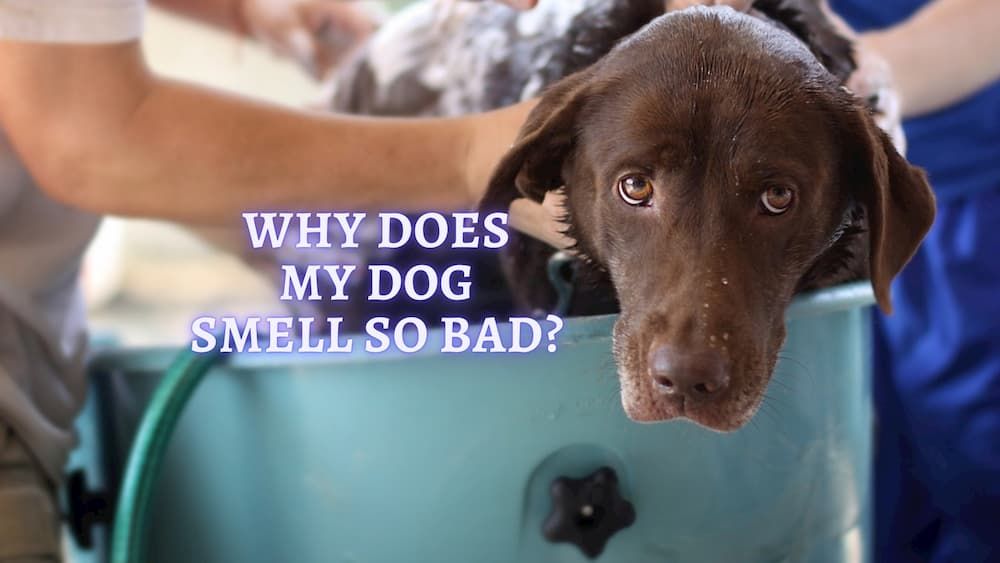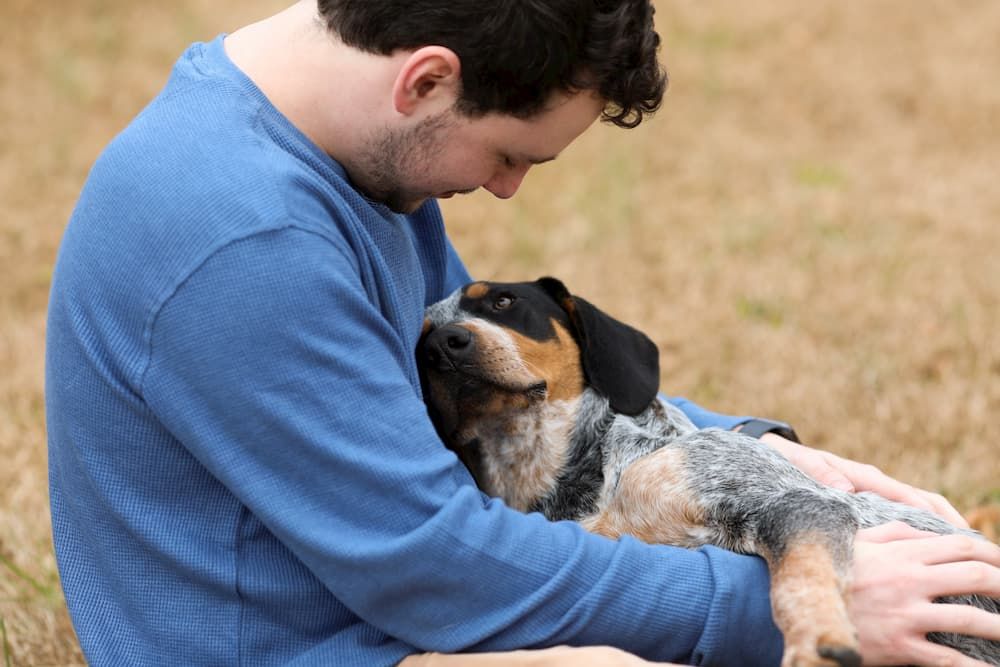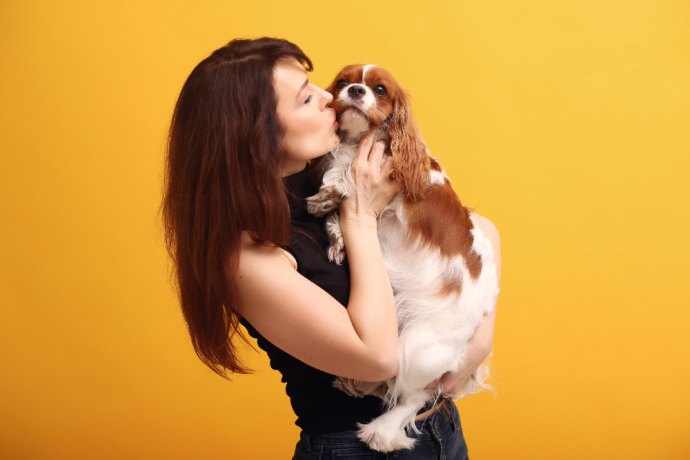Why Does My Dog Smell So Bad? (Veterinary Explained)
Written by:
Author: Dr. Edele Grey
Dr. Edele Grey is a veterinary surgeon with seven years of experience. She professionally works mostly with horses but has treated pets of all sizes including terrapins, llamas, and others. Dr. Grey graduated with honors from the University College Dublin, Ireland, has completed further education in Equine Sports Medicine. In her free time, she enjoys writing about pet ownership and educating people about veterinary care of animals and preventing disease.
View all 10 articlesLearn about our editorial process and veterinary review board.
Viewed: 186
Updated on: 06/28/2023
On occasion, we’ve all noticed an unpleasant smell from our furry friend, and many reasons could cause this. Unfortunately, some odors persist even after bathing your pup.
Causes Why does My Dog Stink
No pooch will ever win an award for smelling like roses, but if your pup starts to stink, that can cause concern, so here’s a rundown of some possible reasons.
1. Skin Diseases
As dermatitis and yeast infections can cause your dog to smell unpleasant. Dogs that suffer from allergies can cause a skin condition called atopy. This disease causes dry skin, inflammation, and scabs, making the skin prone to infection and causing nasty smells.
2. Impacted anal glands
It can cause a fishy smell that persists despite bathing. This is because these glands are just inside your pup’s rectum and release an oily liquid that coat’s your pet’s poop. If the liquid becomes thick and the glands are blocked or infected, your puppy will leave a smelly patch everywhere they sleep. If the smell persists, you should have your vet examine your pooch.
3. Flatulence
It is just a part of life, but excessive tummy rumblings, burping, or odorous gas could indicate problems such as food allergies or inflammatory bowel diseases. The occasional bout may be related to a dietary indiscretion, such as eating human food or something that difficult to digest.
4. Bad Breath or Halitosis
It isn’t just ‘‘doggy breath’’ but a proper malodorous mouth. This is due to one of many dental diseases that affect pets. The most common of these is periodontal or gum disease.
5. Ear infections
These infections are excruciating but also produce a strong-smelling discharge. In addition, these infections can cause severe and permanent damage to a pet’s ear canal, even leading to deafness without veterinary intervention.
6. Grooming
Grooming is a daily task for your pet, but some need an extra helping hand from their human with a brush and regular bathing. This is particularly necessary if your fur baby is aging or suffering from arthritis and isn’t grooming as needed. Some pets are also more prone to oily skin and dander and may require increased bathing and grooming frequency to prevent nasty odors.
Few pooches don’t love to roll in something disgusting, be it a muddy puddle or wild animal poop. Anyone whose dog has been “skunked” can also attest to this foul stench which may require several vigorous showers to eradicate the stink.
READ MORE: The Best Dog Brush for Australian Shepherd
7. Nasty Wounds or Abscesses
It can really smell and produce a stinky purulent discharge. These need to be treated immediately by your veterinarian to prevent sepsis or more serious complications for your pup.
READ MORE: Outdoor activities for Dogs
How to get rid of the Unpleasant Smell of a Dog?
If your pooch is stinking up the house, you need to figure out if it’s easily managed with a bath or if you need to seek your veterinarian’s intervention. A good rule of thumb is a regular bathing schedule for your pooch to prevent a stinky coat.
Regular brushing helps to remove dander and dead hair from their coat. Once a week is suitable for most pets, though longer-haired breeds may need brushing up to three times per week.
Bathing frequency depends on your pooch’s lifestyle. Most need bathing only once per month or so though some may need bathing every two weeks. You should wash your pet in warm, running water with suitable shampoo. You can use a deodorizing shampoo or sensitive skin if your pup uses something soothing and hypoallergenic for their comfort.
Smells can also come from your dog’s bedding. Regular laundering is essential to minimize this, reduce dust dander, and remove flea eggs from the environment. Again, a regular wash is suitable, though you may need to occasionally use a more intensive mode to deep clean the bedding.
READ MORE: Best Online Dog Grooming Courses
If your pet permits tooth brushing, then weekly sessions help you to assess the condition of their teeth and gums. Dental disease is the number one cause of bad breath in pets, and prevention is best possible. However, if your pet won’t permit brushing, you should regularly check their teeth and gums to assess for redness or plaque build-up, or bad breath.
If gas is the source of your pooch’s problem, you may need to consider altering their nutrition. If it’s intermittent or short-lived flatulence, then it may be that your puppy ate something they shouldn’t, but if it persists, then you may need to consider changing your pup’s diet. You should consider this in conjunction with your veterinarian as your puppy may have a food intolerance or allergy.
If you notice a smell from your pet’s ears, an intermittent fishy odor from your pet’s bedding, or any smell from your pooch that persists, then you should contact your veterinarian for an appointment to investigate the underlying cause.
Pet smells throughout the home can be tackled with regular ventilation, vacuuming, and linen laundering.
Conclusion
If you notice an extra funky smell coming from your pooch, you should brush and bathe your pup first. Then, check them over thoroughly for cuts, wounds, or other injuries. Check their teeth and ears for the source of the odor too. If your fur-baby rolled around in something particularly disgusting, it might take a few rigorous shampoos to rid them of their pungent perfume. If the smell persists, you should make an appointment with your veterinarian to investigate the underlying cause.
READ MORE: Signs of Poisoning in Dogs
With so many possible causes for a stinky pup, it’s good to understand these to make a plan to tackle and eliminate these odors. Appropriate nutrition, grooming, and regular bathing all help to keep nasty smells at bay.
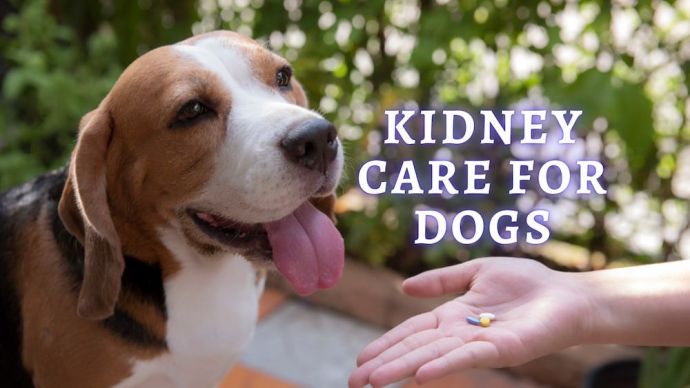 Dog Veterinary Tips Kidney Care for Dogs: How to Improve Kidney Function in Dogs? (Vet Advice)
Dog Veterinary Tips Kidney Care for Dogs: How to Improve Kidney Function in Dogs? (Vet Advice) - 731
- 0
 Dog Training Dog is Acting like a Puppy again: Causes and Solutions from a Vet
Dog Training Dog is Acting like a Puppy again: Causes and Solutions from a Vet - 7099
- 4
 Puppy Care How Much Water Should A Puppy Drink? Vet Advice On Puppies Daily Water Intake
Puppy Care How Much Water Should A Puppy Drink? Vet Advice On Puppies Daily Water Intake - 373
- 0
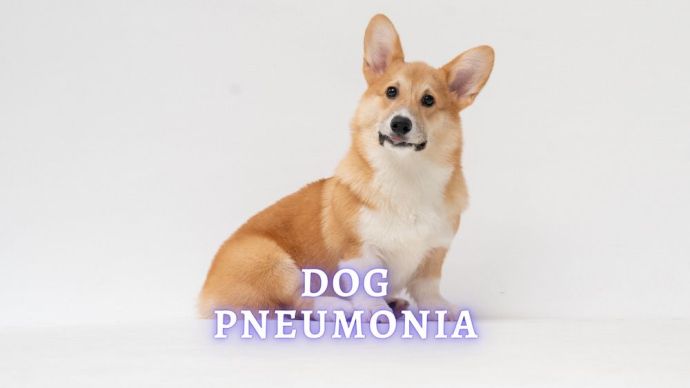 Dog Veterinary Tips Pneumonia in Dogs: Symptoms, Diagnosis, Treatment and Recovery (Vet Advice)
Dog Veterinary Tips Pneumonia in Dogs: Symptoms, Diagnosis, Treatment and Recovery (Vet Advice) - 343
- 0
 Dog Veterinary Tips Why is my Dog throwing up: Causes and Preventing (Veterinary Advice)
Dog Veterinary Tips Why is my Dog throwing up: Causes and Preventing (Veterinary Advice) - 21800
- 5
 Dog Care My Dog Keeps Scratching His Mouth: Reasons Why Your Dog Scratching Face
Dog Care My Dog Keeps Scratching His Mouth: Reasons Why Your Dog Scratching Face - 17168
- 1
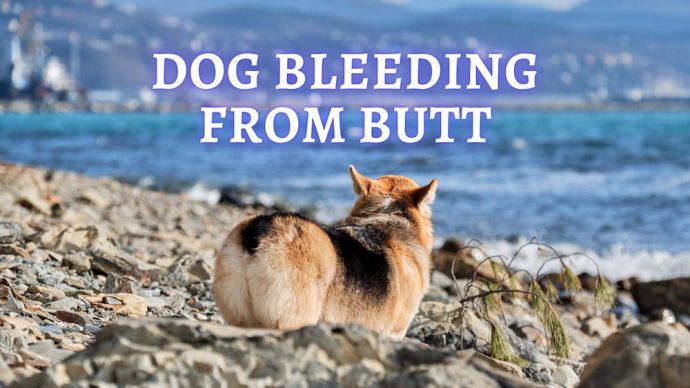 Dog Care Why Is My Dog Bleeding From Its Butt? Causes and treatment of rectal bleeding in the dog
Dog Care Why Is My Dog Bleeding From Its Butt? Causes and treatment of rectal bleeding in the dog - 15103
- 0









